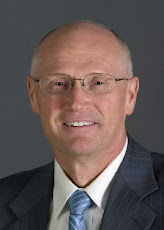Saturday, May 22, 2010
My Origins and How They Affect My View of Public Policy Issues
"What one sees depends on where one stands.” This surely has meaning to an exceptionally short or exceptionally tall person in the physical sense, but also has meaning in one’s outlook in life. That is, our past experiences color how we see the world today. Two people with different backgrounds can see the exact same thing and interpret the occurrence entirely differently.
Because of this, Peter Senge in “The Fifth Discipline” promotes dialogue to explore such differences in backgrounds and perceptions, with the goal to more often arrive at collaborative solutions to problems and issues. He also advises exploring our own perceptions and their origins, and scrutinizing them to see whether they square with reality.
This phenomenon of how external stimuli are filtered by our past experiences to create our current perceptions partly explains our political differences. In the hopes that my views can be better understood and thus make finding common ground more possible, I have given some thought to and hereby share My Origins and How They Affect My View of Public Policy Issues of the Importance of Education, the Welfare State and Poverty, Medical Care as a “Right”, Our “Dependency Culture” and Immigration.
Friday, October 9, 2009
How to Influence Public Policy
The purpose of political activism is to influence public policy. Sometimes this gets confused with being in politics to win elections, but winning elections is simply a means to an end – that being to influence public policy. This article explores the multiple ways that may be done.
- Write a letter to your elected official. For hints on how to write an effective letter, click here.
- Write a letter to the editor or other publication. Letter to Editor Guide.
- Comment on articles on the internet.
- Join an online social networking page (e.g., Facebook, MySpace, etc.), invite friends and share articles consistent with your beliefs.
- Create a blog about political issues. Its free at https://www.blogger.com/start
- Contribute to a campaign, political action committee or political party. Yes, money is still the mother’s milk of politics.
- Volunteer on a campaign to help elect an official with whom you agree by putting up a yard sign, telephoning, endorsing the candidate, doorbelling, hosting a coffee hour, stuffing envelopes, etc.
- Volunteer on a campaign to help elect an official with whom you wish to gain access to better express your viewpoint, with the hopes of actually influencing his/her votes on issues.
- Attend a rally to show support and/or opposition to policies.
- Join a political activist group, such as Americans for Prosperity, Campaign for Liberty, Tea Party Express, Tax Day Tea Party, Michigan FairTax Association, Michigan Taxpayers Alliance, RightMichigan.com, Heritage Foundation of Southeast Michigan, etc.
- Get active in a political party. (of course, we are hoping that is the Republican Party)
- Attend political events, such as political party picnics, Lincoln Day Dinners, parades, fair booths, etc. to get acquainted with politicians and elected officials.
- Attend forums, town hall meetings, coffees, etc. hosted by politicians and elected officials to stay informed and contact officials directly.
- Go to Washington/Lansing/Township Board/County Commission/School Board meetings and testify on an issue.
- Run for office in a hard to win race to enable you to have your voice being heard in debates, etc.
- Run for an office to get elected.
Of course, you will be able to best influence public policy if you remain informed and be and sound credible. In addition to the organizations above that disseminate information, here are additional sources of Michigan issues you may wish to tap into: Sources of Balanced Discussion of Issues At the federal level, two of my non-partisan favorites are The Hill and the Committee for a Responsible Federal Budget.
Humans have a natural tendency to collect additional data (and be receptive to sources which provide such data) that confirms their already formed opinions and beliefs. In effect, we put on blinders, so we don't see disconfirming information.
No one knows everything. Everyone's perception of "reality" is filtered by our prior experiences. In short, no one has the monopoly on "the truth". Thus we must stay open to hearing facts and opinions that do not agree with our own. To counteract our natural tendencies, we must seek out contrary sources. If it turns out that our beliefs and opinions are not supported by facts, then we must be willing to rethink our positions and form a new belief. Such constant re-evaluation of one's beliefs is not "waffling", but rather simply an application of the scientific method applied to theories in action.
Comments? Addition suggestions?

